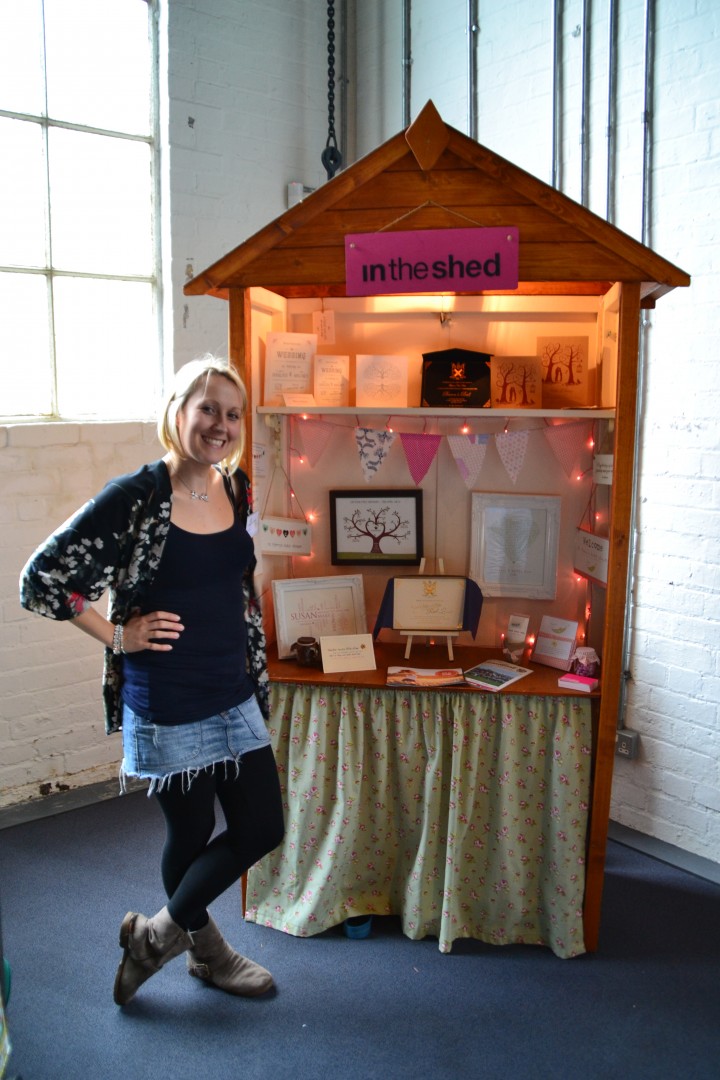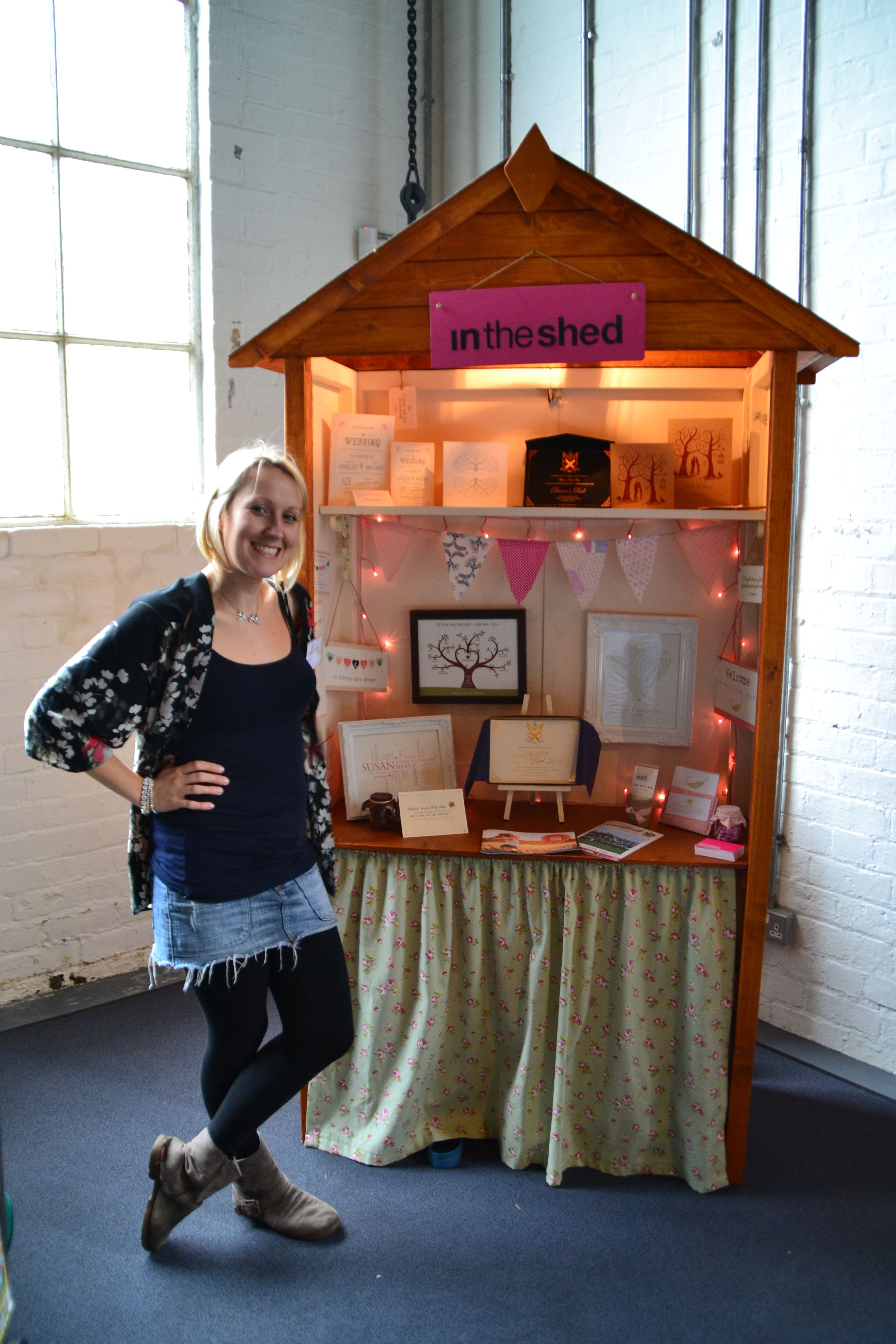Today being day 5 of the 2014 Dyslexia Awareness Week it gives me great pleasure to introduce you tomy next inspirational and another of my favourite dyslexics; Nicola Rust, she is creative, positive and proactive!
Name:
Nicola Rust
Age (optional):
31
Business name:
In The Shed
A brief description of what you/your business do/does:
I am a graphic designer as well as a dreamer, believer, optimist and creator. Yes, I do actually work in a shed, and I am joined everyday by my adorable Chihuahua Boo.
I work with clients small and large, local and international on a range of design projects including magazines, invitations, brand identity and corporate literature. My work varies from very corporate work to very pretty and much more crafty and I am planning to launch my own range of invitation designs very soon.
Area you live/your business is based:
Shrewsbury
When did you find out you were dyslexic?
When I was 20, at University. I had been browsing through a magazine and stumbled upon an article about ADHD. As I often do with magazines, I read the pull out boxes first before committing to the whole article. It contained a checklist of symptoms to see if your child might be ADHD, and there I was at the age of 20, sat in my halls of residence ticking most of them off. I joked about it with my tutor one afternoon, and having previously mentioned to him I felt I was struggling to understand some of the literature we had been given, he suggested I might be dyslexic.
How did you feel when you found out you were dyslexic?
Finding out felt like a relief, an answer. It hadn’t been obvious before as I didn’t really know or understand what dyslexia actually was. It made sense when somebody explained. Looking back, there were habits, traits, and sometimes mistakes, which at the time I just brushed off. I would never have thought they would be related to dyslexia. I have always felt different to others. Even though I would brush off certain traits as just being me, there was something inside that still bugged me. Not knowing why I felt different to others. Now it started to make sense.
Like anything though, I couldn’t just accept dyslexia was the answer and leave it at that. Just because there was a name I could attach to some of my behaviours, I needed to understand what that meant and why it happens? I went on to research more about what dyslexia is, and have since grown to understand how it affects me.
What difference has it made, if any, to your life /business since you found out you are dyslexic?
Rather than dyslexia make a difference to my business, I actually believe that running my business has had a really positive impact on being dyslexic.
I have found that by having the control and flexibility of running my own business, it has considerably improved skills that I previously found difficult because of dyslexia. I used to find some of my dyslexic traits such as poor time keeping, organisation, time management really challenging. Running a business has meant I have found and developed my own ways of improving these skills and have noticed a huge improvement in how I plan and manage my time both in life and in business.
What advice would you offer to other dyslexics?
My biggest piece of advice is to be aware of how you refer to dyslexia. Whether you refer to your own experience of dyslexia or to someone else’s, some word choices can be very negative and therefore damaging to confidence and motivation.
Words have a very powerful influence on how we feel, and certain words can be very negative and disabling.
For example, referring to dyslexia as a ‘problem’ is very negative. Yes dyslexia does have its challenges of course, but I believe that calling it a ‘problem’ can be harmful. I have heard many people refer dyslexia as a problem, for example I have heard parents say “The problem with my child is…” in relation to their dyslexia. I believe that can have a really negative impact on how dyslexia is viewed both by the parent and the child.
Dyslexia is a different way of thinking. Dyslexia is neither better nor worse. It’s just different. Of course it has its challenges, and yes they may be difficult. But I truly believe that dyslexia should not be referred to as a ‘problem’. It is a different way of thinking and therefore creates a need for a different way of learning.
Another example of words that can have an negative impact are words such as ‘struggle’ or ‘can’t’. For example, if you say you struggle with something, you will struggle with it, or if you say you can’t do something then you won’t. A good replacement is to change the word ‘struggle’ to ‘challenge’. What could have been a ‘struggle’ now becomes do-able. It may not be easy, but it is achievable and much more motivating.
This was some of the most powerful advice I was given and has totally changed the way I talk about dyslexia now.
What do you do to relax/hobbies?
I love walking my little dog Boo. She joins me every day in the shed, and it is a great escape from sitting at the desk to get out and take her for a walk.
Anything you want to add?
The best book I read, and one of the easiest, mainly because it made sense, is The Gift of Dyslexia by Ronald D. Davis. It explained how the dyslexic brain behaves differently and why all those little habits and traits I had, such as being clumsy, being late for school (often) and irritating others with my legs shaking uncontrollably under the desk, are connected. It was a series of light bulb moments as I read each chapter, certainly worth a read to find out more.
Your website & business contact details:
www.in-theshed.co.uk
Eli’s Note:
If you would like to read more about Nicola’s experiences with Dyslexia, please feel free to have a read of her blog “Thinking Differently?”

